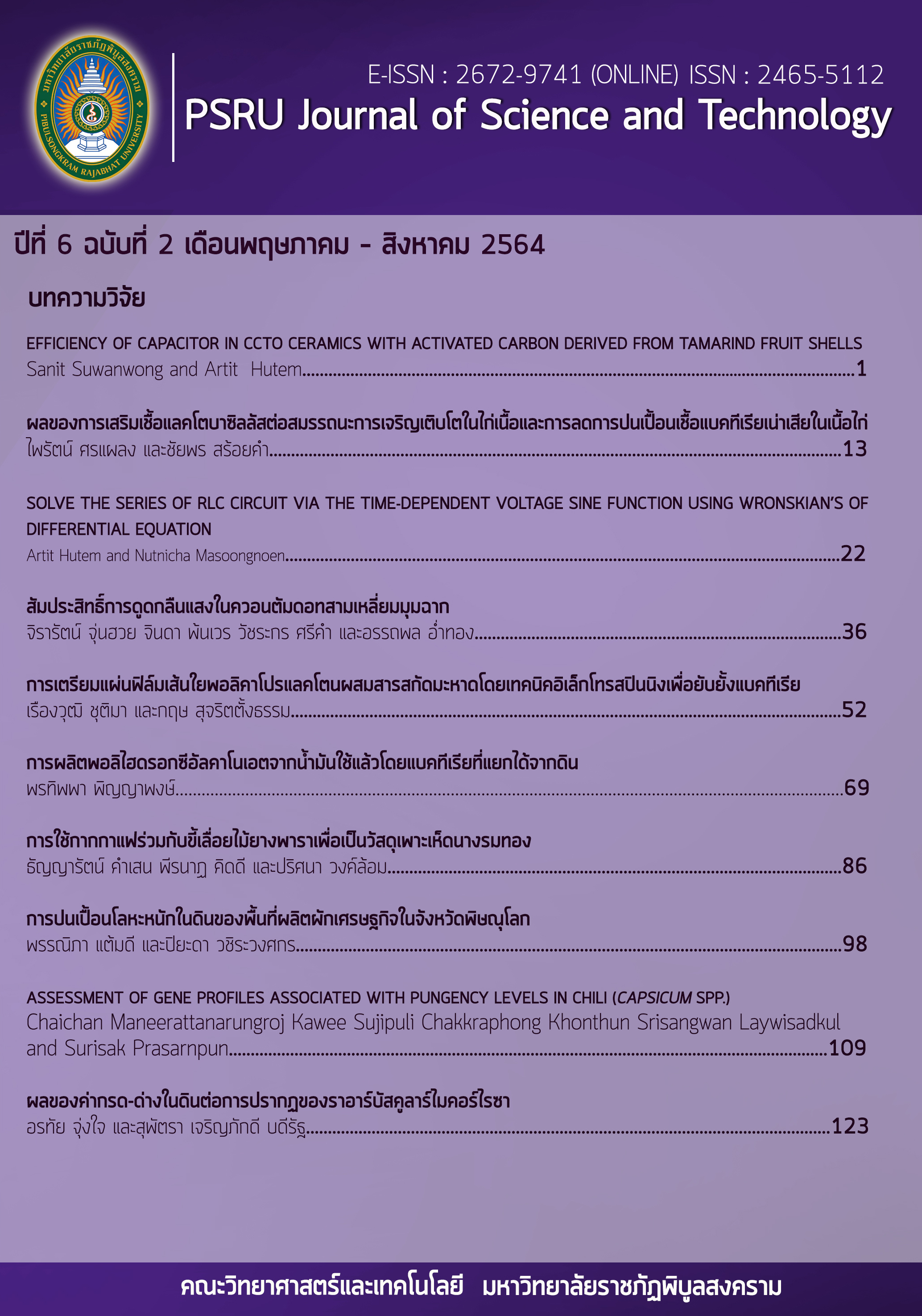EFFECT OF LACTOBACILLUS SPP. SUPPLEMENTATION ON GROWTH PERFORMANCE AND DECREASING CONTAMINATION OF SPOILAGE BACTERIA IN CHICKEN MEAT
Keywords:
Lactobacillus spp., Spoilage bacteria, Chicken meatAbstract
This study aims to investigate effects of Lactobacillus spp. on growth performance in broiler chicken and on bacterial spoilage contamination in their meat under refrigeration storage (4-6°C). Ninety chicks (1 day old) were randomly assigned into 3 groups with 30 chicks per group. Three diets were provided following: group 1 basal diet (recommended by NRC), group 2 basal diet supplemented with Lactobacillus salivarius L61 (1´107 CFU/ g of feed) and group 3 basal diet supplemented with commercial probiotic strain (Lactobacillus plantarum Fr-B) (1´ 107 CFU/ g of feed). Lactobacillus supplementation was started at 25 day old and finished at 35 day old of broilers. Each group of 10 chicks was randomly slaughtered and sampled intestinal contents for coliform plate count. Breast meat samples were collected under refrigeration storage (4-6 °C) for 1 and 3 days, and analyzed for coliform bacteria and Pseudomonas spp. counts. This result showed that L. salivarius L61 supplementation improved growth performance (p< 0.05) compared to control group. Coliform and Pseudomonas spp. counts in refrigerated meat at 1 day from chickens raised basal diet with either L. salivarius L61 or L. plantarum Fr-B supplementation were significantly lower (p< 0.05) compared to control group. Moreover, L. salivarius L61 supplementation showed the highest reduction of Pseudomonas spp. counts in meat under refrigeration storage for 1 or 3 days compared to control group (p< 0.05). L. salivarius L61 supplementation can reduce contaminant coliform and Pseudomonas spp. counts in meat under refrigeration storage for 1 day at 84.16% and 98.42%, respectively. This study indicated that supplementation of L. salivarius L61 in broiler diets may improve shelf life of broiler chicken meat under refrigeration storage.
References
ไพรัตน์ ศรแผลง, ถนอม ทาทอง, และสุทธิพงศ์ อุริยะพงศ์สรรค์. (2546). เชื้อแบคทีเรียที่ทำให้เกิดการเน่าเสียในเนื้อไก่ที่จำหน่ายตามห้างสรรพสินค้าในจังหวัดขอนแก่น. วารสารแก่นเกษตร, 31(4), 236-241.
สัญชัย จตุรสิทธา. (2543). เทคโนโลยีเนื้อสัตว์. เชียงใหม่: ภาควิชาสัตวศาสตร์ คณะเกษตรศาสตร์มหาวิทยาลัยเชียงใหม่.
สุนีย์ นิธิสินประเสริฐ, เพ็ญแข วันไชยธนวงษ์, สุเจตน์ ชื่นชม, และณัฐชนก อมรเทวภัทร (2548). ผลของ Probiotic “Lactobacillus reuteri KUB-AC5” ต่อการเจริญเติบโตของไก่เนื้อ (รายงานการวิจัย). กรุงเทพฯ: สำนักงานคณะกรรมการวิจัยแห่งชาติ.
Chabela Perez, M.L., Serrano Rodriguez, G.M., Calderon, P.L., & Guerrero, I. (1999). Microbial spoilage of meats offered for retail sale in Mexico City. Meat Science, 51, 279-282.
Deeb, A.M.M., & Ahmed, H.F. (2010). Effect of potassium sorbate And / or probiotic bacteria on spoilage bacteria during cold storage of soft cheese. Global Veterinaria, 4(5), 483-488.
Defigueiredo, M.P., & Splittstoesser, D.F. (1976). Food microbiology public health and spoilage aspects. (2nd ed.). USA: AVI Publishing Company Inc.
Gilliland, S.E., Speck, M.L, & Moran, C.G. (1975). Detection of Lactobacillus acidophilus in feces of humans, pigs, and chickens. Applied Microbiology, 30(4), 541-545.
Garbutt, J. (1997). Essentials of Food Microbiology. UK: Arnold.
National Reseach Council. (1994). Nutrient Requirement of Poultry. (9th ed.). USA: National Academy press.
Nousiainen, J, & Setala, J. (1998). Lactic acid bacteria as animal probiotics. In S. Salminen, & von Wright, A (Ed.) Lactic Acid Bacteria. (2nd ed.). USA: Mercel Dekker Inc.
Puphan, K., Sornplang, P., & Uriyapongson, S. (2013). Cultivation of Lactobacillus sp. and production of probiotic powder as animal feed additive. Pakistan Journal of Nutrition, 12(6), 567-570.
SAS for Window. (1997). SAS User’s guide for PC. computers. USA: SAS Institute Inc.
Schneitz, C. (2005). Competitive exclusion in poultry-30 years of research. Food Control, 16, 657 – 667.
Sornplang, P. (2009). Characterization of Lactobacillus from Thai native chicken gut and utilization in the diet to improve growth performance and cholesterol reduction in broilers. (Doctor’s thesis). Khon Kaen University. Thailand.
Sornplang, P., Leelavatcharamas, V., & Soikum, C. (2015). Heterophil phagocytic activity stimulated by Lactobacillus salivarius L61 and L55 supplementation in broilers with Salmonella Infection. Asian-Australasian Journal of Animal Sciences, 28, 1657-1661.
Downloads
Published
How to Cite
Issue
Section
License
กองบรรณาธิการขอสงวนสิทธิ์ในการปรับปรุงแก้ไขตัวอักษรและคำสะกดต่างๆ ที่ไม่ถูกต้อง และต้นฉบับที่ได้รับการตีพิมพ์ในวารสาร PSRU Journal of Science and Technology ถือเป็นกรรมสิทธิ์ของคณะวิทยาศาสตร์และเทคโนโลยี มหาวิทยาลัยราชภัฏพิบูลสงคราม และ
ผลการพิจารณาคัดเลือกบทความตีพิมพ์ในวารสารให้ถือมติของกองบรรณาธิการเป็นที่สิ้นสุด







